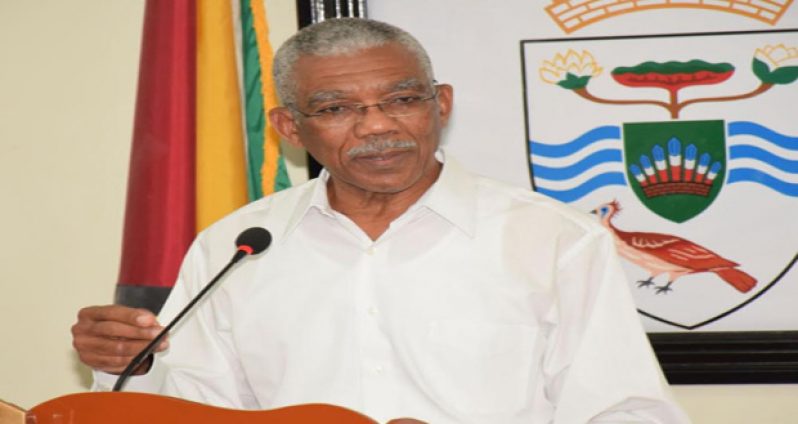HEAD of State President David Granger says his Administration is being wrongly and unfairly accused and targeted by rice farmers. The President made this disclosure at his first press briefing held at the Office of the Presidency, yesterday.Granger said his Administration is attempting to soothe the situation with rice farmers and millers with respect to delayed payments for rice exports to Panama, but the issue is not a government issue but rather a private sector one.
The President’s statement came as government is expected to pay some Gy$500M to millers and farmers. President Granger believes that a significant issue is the failure of millers to pay farmers which he said is a “private arrangement”.
“Without making any accusation, sometimes the millers receive payment for their rice but don’t pay for their paddy. There are problems within the rice community which are not to be blamed on the Government of Guyana,” he said.
Over the past few weeks, the Rice Producers Association has staged several protests against the Administration stating that it (government) is responsible for the loss of Venezuelan paddy and rice market due to its handling of the Guyana-Venezuela border controversy.
But, President Granger said his government has been unfairly targeted. “As far as this protest is concerned, it is misplaced. The paddy farmers should be protesting against the people who owe them money. We don’t owe them any money,” he said.
Also, the President opined that there are “elements instigating protests” to give the impression that his government is at fault for the rice and paddy dilemma. “Let me make it clear, there are elements instigating protests to create the illusion that the government is at fault,” President Granger posited.
Granger said the paddy farmers should protest against the people who owe them money; “we don’t owe them any money.”
Minister of Agriculture Noel Holder, on Friday just prior to the President’s press briefing, announced that Gy$500M would be available to pay rice farmers since the Panama government failed to honour its contractual obligations.
“The millers are hurting and are unable to pay the farmers; the Government will now have to get involved. The Government, through the Ministry of Agriculture and the GRDB, is prepared to honour the first level of credit to pay the millers so that farmers can be paid with a sum of approximately $500 million, and this is what the Government is prepared to do almost immediately,” Minister Holder told reporters.
The Agriculture Minister added that because the Spanish speaking country failed to pay for rice already shipped to it, millers are not in a financial position to pay farmers. As such, government will honour the first letters of credit.
Last year, the governments of Guyana and Panama signed an agreement that would have seen Panama purchasing 5000 tonnes of rice per month from Guyana. That country imports about 150,000 tonnes of rice annually and the move by Panama to import rice from Guyana is to ensure that the country is able to have access to the staple at an affordable price. Guyana on the other hand said the agreement would make the country more competitive in an open market to supply additional rice yearly. The arrangement was expected to see Guyana exporting approximately 500,000 tonnes this year.
Notwithstanding the issues facing millers and farmers, Guyana’s President said he is keen to market the country’s products and had discussions to that effect while in New York at the just concluded United Nations (UN) General Assembly.
“We are searching for markets to help the private millers and farmers. We want the industry to survive and to prosper but we must look at the internal dynamics of the industry and you will discover that it’s a miller-farmer problem, not a government-rice problem,” President Granger said.
He added that the millers and farmers arrangement is “a private enterprise” but Guyana is pushing to ensure that other avenues are opened for the sale of rice.
“I met the President of Senegal, I am looking for markets for rice — I said the main focus of Guyana’s foreign affairs ministry is economic diplomacy – I want to sell rice, rum, plantain chips, I want to sell stuff…,” he said affirmatively.
By Ariana Gordon




.jpg)









